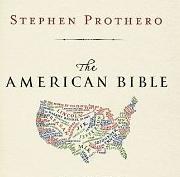 Stephen Prothero is the author of the book “The American Bible: How our words unite, divide and define a nation” and “Religious Literacy and God Is Not One”, and also a professor of religion at Boston University. His recent essay was featured in the Wall Street Journal.
Stephen Prothero is the author of the book “The American Bible: How our words unite, divide and define a nation” and “Religious Literacy and God Is Not One”, and also a professor of religion at Boston University. His recent essay was featured in the Wall Street Journal.
At the beginning of the American experiment, foreign visitors noted a key difference between the United States and its European kin. The United States was not held together by blood or custom. Its citizens spoke different languages and worshipped in different ways. “If there is a country in the world where concord, according to common calculation, would be least expected, it is America,” wrote Thomas Paine. “Made up as it is of people from different nations, accustomed to different forms and habits of government, speaking different languages, and more different in their modes of worship, it would appear that the union of such a people was impracticable.”
Today many U.S. citizens imagine that our unity is creedal, resting on some political analog to Christianity’s Nicene Creed. “America is an idea,” Bill Clinton told a Georgetown audience in 1995. “To be an American is not to be someone, but to believe in something,” adds colonial historian Gordon Wood in his new book “The American Idea.”
But there is no one American idea. To be sure, Americans have long championed “liberty” and “equality.” But they disagree fiercely about what each of these words means and how to weigh their competing claims.
Americans do share, however, a collection of core texts that “we the people” regard as authoritative and a long-standing tradition of debating what these texts have to tell us about the meaning of “America.” To be an American is to debate whether the business of America really is business. It is to ask about budget deficits or public Christmas displays, “What would Jefferson do?” Whereas Catholics come together to participate in the Mass, Americans come together to argue about the speeches, songs and sayings that compose the “American Bible.”
This unofficial canon includes founding documents such as the Declaration of Independence and the Constitution as well as songs such as “God Bless America” and speeches by Washington, Lincoln, FDR and Reagan. It also includes novels from “Uncle Tom’s Cabin” to “Atlas Shrugged.”
What makes these texts American scripture is not so much that Americans call them sacred or treat them like sacred objects (though in many cases we do both). What makes them scripture is the fact that Americans use these texts like Christians use the Bible. These are the speeches and songs, novels and letters we invest with authority. These are the voices that generate criticism and controversy.
Like the Jewish scriptures, the books in the “American Bible” live through commentaries, which are as much a part of our national conversation as the primary texts themselves. Whenever we call something “un-American” or say “That’s what America’s all about,” we are declaring allegiance to our republic. And whenever our fellow citizens disagree with us, they are doing the same.
Scholars of religion have long distinguished between orthodoxy (right belief) and orthopraxy (right practice), observing that certain religious traditions (Christianity, for example) unite around shared beliefs while others (such as Judaism) unite more around shared practices. The United States is a Jewish nation in this regard, knit together not so much by a common creed as by a common practice—the practice of arguing about our not-so-common creed.
This practice only works to bind our nation together if it is civil and informed. And nowadays these desiderata are in short supply. But what ails us is not just a matter of the words we choose or the tone we adopt. There is also the matter of our collective amnesia. The chain of memory linking us to the great voices of our past has been broken. So when we think of political debate we do not think of Lincoln and Douglas. We think Limbaugh and Maher.
Memorial Day is a day to remember our fallen soldiers. It is also a day to work to repair the chain of memory that links us to our shared past—a day to revisit both Lincoln’s “Gettysburg Address” and the great tradition of conciliation he exemplified. “We are not enemies, but friends,” he said in his First Inaugural Address. “We must not be enemies.”
That doesn’t mean we must agree. There is nothing un-American about criticizing a book in the “American Bible.” Look Lincoln in the eye and tell him that liberty, not equality, is America’s founding proposition. Tell King you have a different dream. But as you criticize these men, know what you are doing. You are not opting out of America; you are opting in.
Disclaimer: Articles featured on Oregon Report are the creation, responsibility and opinion of the authoring individual or organization which is featured at the top of every article.


